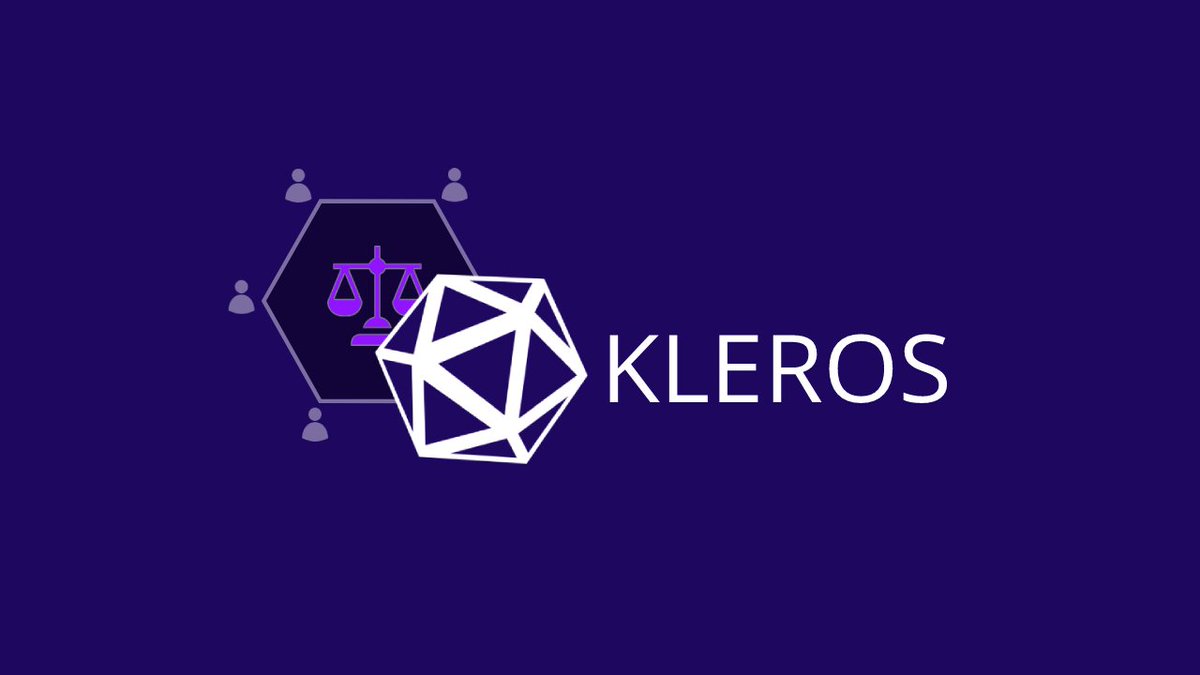How will we resolve disputes in Web 3.0? Check out this thread on @Kleros_io which is building a decentralized justice protocol (with many use cases) https://abs.twimg.com/emoji/v2/... draggable="false" alt="👇" title="Rückhand Zeigefinger nach unten" aria-label="Emoji: Rückhand Zeigefinger nach unten">
https://abs.twimg.com/emoji/v2/... draggable="false" alt="👇" title="Rückhand Zeigefinger nach unten" aria-label="Emoji: Rückhand Zeigefinger nach unten">
1/ Why do we need Dispute resolution (DR)? DR is key to exchange and trade. It& #39;s the process of resolving disputes and conflicts between parties. These arise as contracts are incomplete (yes, even smart contracts). We cannot foresee all eventualities when signing a contract.
2/ We are increasingly transacting and operating online (more Global, smaller transactions). Disputes are increasingly complex, focused on niche topics requiring specialized knowledge and expertise. Our existing justice system isn& #39;t built for this.
3/ Web 2.0 platforms faced this same issue. They relied on alternative dispute resolution systems and created their own internal systems to resolve disputes. This enabled them to handle disputes faster and at a lower cost which made their business models viable, to begin with.
4/ With Web 3.0 we are moving from walled gardens, where the user is the product, to open protocols where the user is a co-owner. But we won& #39;t stop transacting & exchanging now, will we? Kleros is building the dispute resolution system for, and native to Web 3.0.
5/ Kleros combines crowdsourced jurors/experts (think Wikipedia), game theory (shelling points), and crypto-economics (incentives) to resolve disputes.
6/ Anyone can become a juror by staking capital in one of Kleros& #39;s courts. They are selected at random. If Jurors vote coherently with the majority, they are rewarded. Otherwise, they are penalized. Jurors are thus incentivized to stake in courts in which they have expertise
7/ Two parties entering into an agreement, need to agree to use Kleros for dispute resolution when setting up a contract. This also entails that funds are kept in escrow. However, Kleros can also be integrated and built upon by other platforms.
8/ Kleros coordinates the exchange between suppliers (Jurors) and consumers (parties in a dispute). Kleros wants to create a public infrastructure layer for dispute resolution, that any platform can interact with. It makes the dispute resolution process much more efficient.
9/ Disputes can take many shapes and sizes and can involve individuals but also entities. Jurors basically need to make decisions based on information and data. There are thus many potential use cases for a protocol like Kleros.
10/ E-commerce and freelance marketplaces are obvious examples. Kleros created @kleros_linguo which is a P2P (freelance) translation application. Translators and reviewers are incentivized to properly translate text. If a dispute arises it is sent to the Kleros translation court.
11/ Kleros can be used for disputes around curation. With the Kleros curated token list users are incentivized to add crypto-tokens to a list if they match the criteria. If there is a dispute between two users regarding a token, it goes to Kleros for DR.. https://tokens.kleros.io/tokens ">https://tokens.kleros.io/tokens&qu...
12/ ..This list can be used by DEXs (for token compliance).
One could use a similar process for other lists, websites, or information repositories. Think insurance claim verification, hardened Wikipedia, and content moderation on social media for example https://twitter.com/jack/status/1266390510278569984">https://twitter.com/jack/stat...
One could use a similar process for other lists, websites, or information repositories. Think insurance claim verification, hardened Wikipedia, and content moderation on social media for example https://twitter.com/jack/status/1266390510278569984">https://twitter.com/jack/stat...
13/ Specifically to Web 3.0, Kleros can help connect real-world data with the blockchain. Specialized courts could help fulfill the long tail of off-chain data needs. https://blog.kleros.io/the-kleros-realit-io-oracle/">https://blog.kleros.io/the-klero...
14/ Kleros could also become a court for DAOs: a) A DAO could choose to use a system like Kleros if it wants to uphold a social contract. If members of a DAO make a decision through traditional governance that goes against “its constitution”, the case could be taken to Kleros.
15/ b) Kleros could also be used in the case of disputes or breaches of contract that might arise between DAOs in a partnership/alliance. https://twitter.com/_0x_larry/status/1367981619626262535">https://twitter.com/_0x_larry...
16/ Kleros is currently creating the Proof of Humanity list in partnership with @DemocracyEarth . The aim is to create a curated list of verified/real humans using Kleros. The list itself can then be used as a registry to distribute $UBI for example. https://blog.kleros.io/proof-of-humanity-building-the-internet-of-humans/">https://blog.kleros.io/proof-of-...
17/ While Kleros offers increased efficiency for many types of disputes, it is not always the best option. High stake cases, where subjectivity and fundamental rights are at play, are better left to the traditional system.
18/ As of today, Kleros has resolved over 575 disputes, has 574 staking jurors, and has paid over 325 ETH to Jurors. As our lives move increasingly online, so will our need for an online, open, and efficient dispute resolution system like Kleros. https://twitter.com/JimmyRagosa/status/1356230397575786498">https://twitter.com/JimmyRago...
end/
Thanks for reading!
Take a look at the full article on @_Tokemy if you want to further deep dive into Kleros. Also, join the @Kleros_io community on telegram/discord. https://tokemy.com/kleros-dispute-resolution-for-web3/">https://tokemy.com/kleros-di...
Thanks for reading!
Take a look at the full article on @_Tokemy if you want to further deep dive into Kleros. Also, join the @Kleros_io community on telegram/discord. https://tokemy.com/kleros-dispute-resolution-for-web3/">https://tokemy.com/kleros-di...

 Read on Twitter
Read on Twitter " title="How will we resolve disputes in Web 3.0? Check out this thread on @Kleros_io which is building a decentralized justice protocol (with many use cases)https://abs.twimg.com/emoji/v2/... draggable="false" alt="👇" title="Rückhand Zeigefinger nach unten" aria-label="Emoji: Rückhand Zeigefinger nach unten">" class="img-responsive" style="max-width:100%;"/>
" title="How will we resolve disputes in Web 3.0? Check out this thread on @Kleros_io which is building a decentralized justice protocol (with many use cases)https://abs.twimg.com/emoji/v2/... draggable="false" alt="👇" title="Rückhand Zeigefinger nach unten" aria-label="Emoji: Rückhand Zeigefinger nach unten">" class="img-responsive" style="max-width:100%;"/>





